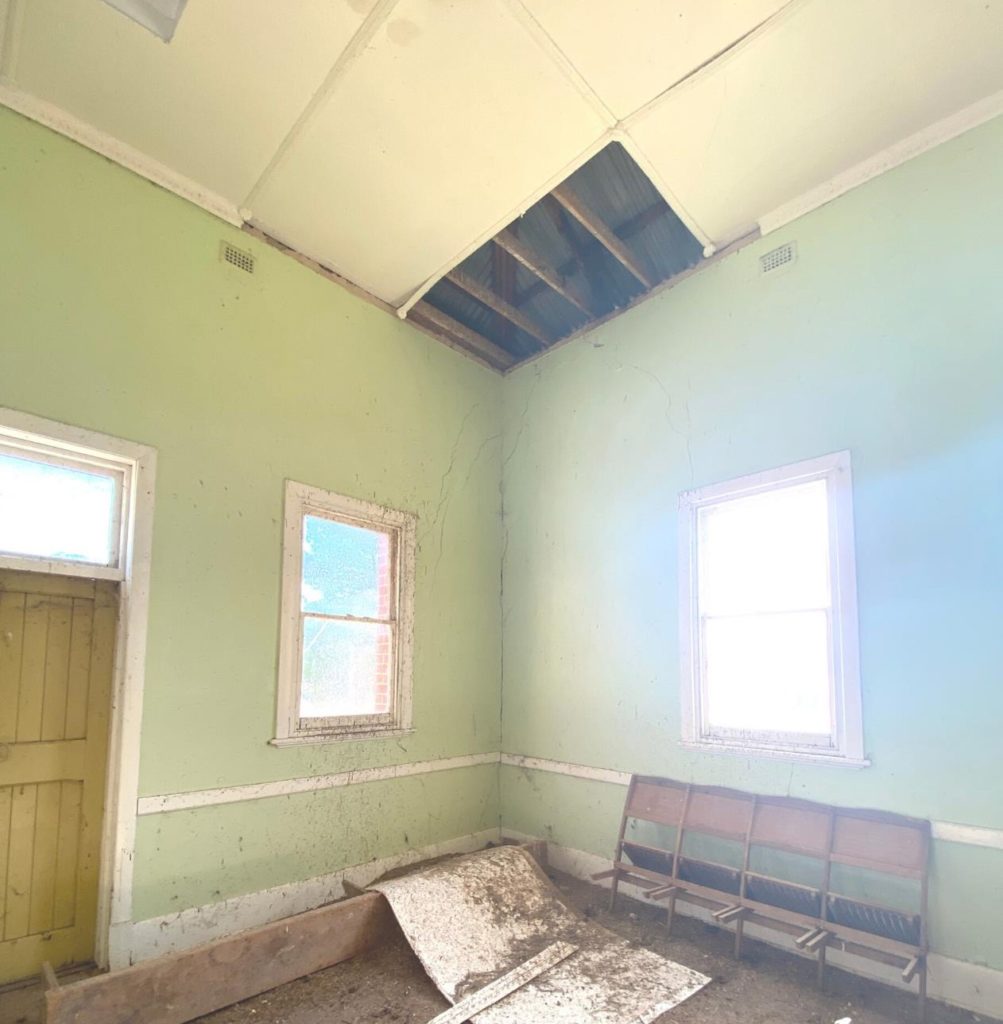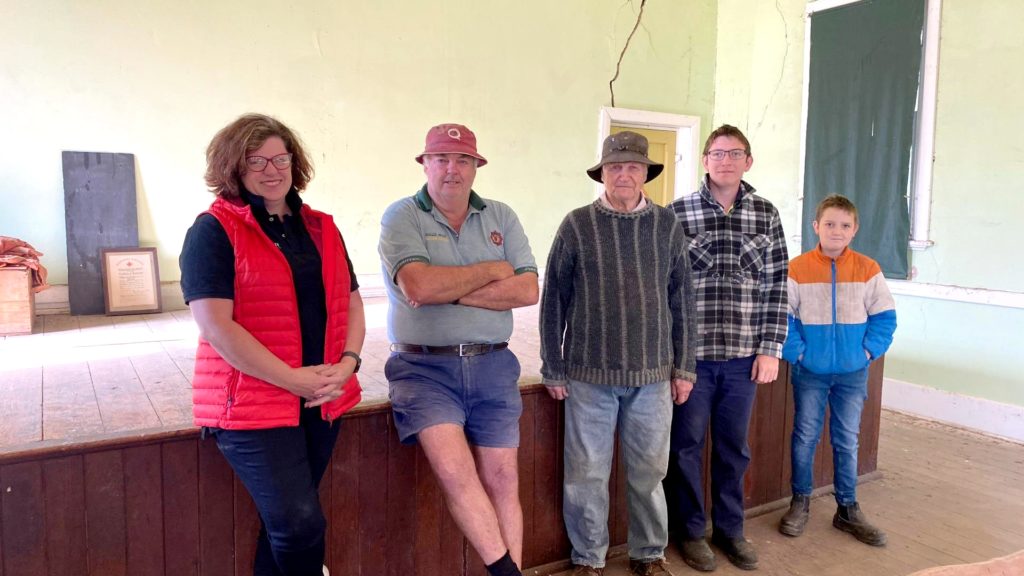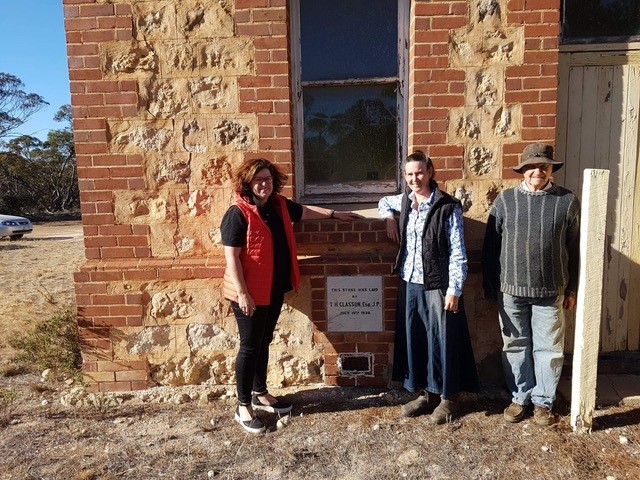Foundation for Rural & Regional Renewal (FRRR)
Funding to strengthen community networks and capabilities
FRRR is inviting applications from community organisations in remote, rural and regional communities for projects designed to enhance local drought preparedness.

Supported by the Australian Government’s Future Drought Fund through the Helping Regional Communities Prepare for Drought Initiative, the Small Network Grants program can fund simple, one-off or seed-type initiatives to strengthen community networks and capabilities in 35 agriculture-dependent regions.
Nina O’Brien, FRRR’s Disaster Resilience and Recovery Lead, said that there are a wide range of one-off projects that promote community networks, which the program can fund.
“Through this program, we are enabling agriculture-dependent communities to identify and act on their drought preparedness and resilience priorities at a grassroots level in the ways that best suit their communities.
“From previous programs, we know that social networks are critical to drought resilience because they promote a sense of belonging by providing opportunities for a diverse range of community members to connect and participate.
“Events, such as field days or practical workshops, are effective tools for improving mental health and wellbeing, because they give participants the opportunity to connect with their neighbours and learn skills to address the local risk factors associated with a changing climate. So we look forward to seeing the projects that come forward,” Ms O’Brien said.
FRRR wants to hear from groups with projects that fit into one of these five categories:
- Networks: Initiatives to strengthen the capacity, capability, and coordination of professional, social or community networks
- Community Events: Field days, conferences, forums, summits, and seminars that facilitate professional, social and community connection to build understanding of drought and climate change associated risks.
- Training: Initiatives to improve skills and capacity in community risk management, planning and project delivery in relation to drought.
- Community Infrastructure: Small scale community infrastructure projects to improve connectedness, wellbeing, and facilities.
- Development and Learning: Initiatives to facilitate professional, personal and leadership related development and learning to support drought preparation.
There are two streams of funding – one offering up to $20,000 in agriculture dependent LGAs in priority remote, rural and regional locations, and the second stream offering up to $50,000 in eligible LGAs in the NSW Far West, NT Tablelands, NT Arid Lands and WA Great Southern regions, where there is no active Community Impact program. Details of the LGA’s in each stream are on FRRR’s website.
Applications are open now and close 14 November 2023, with successful applicants announced in March 2024. There will be a second round of the program, which is expected to open in February 2024, with funds announced in June 2024.
For more information, and to apply, visit the program page.
Karridale, in the Blackwood region of southwest Western Australia, is home to a rich agricultural community. Established in 1991, the Lower Blackwood Land Conservation District Committee (LBLCDC) draws its membership from local landholders who have an interest in sustainable agricultural and land management practices that will protect and conserve their special environment.

There is growing interest and awareness among local farmers of regenerative agriculture principles as a way to sustainably manage their land and productivity and strengthen their drought resilience. However, the LBLCDC identified a need for greater understanding of these principles, as well as how to implement them.
They noted a lack of access to resources and expertise to support farmers in creating resilient and responsive landscapes. They also saw the need for more peer-to-peer support and believed that conversations could combat isolation and foster a sense of community among local farmers.
In 2022, the LBLCDC decided to develop an online community forum and information hub that could bring the community together to connect and learn. Supported by the Australian Government’s Future Drought Fund, FRRR provided $49,850 through the Networks to Build Drought Resilience program to assist the LBLCDC with the design and delivery of their digital platform.
Driven by a content manager, the establishment of their online community (known as Talkin’ After Hours) allowed for the development of significant new drought resilience content. Although hampered by short timelines, the platform produced and delivered six webinars and five podcasts, with a further podcast, six written pieces and six short videos also developed and ready for release over the coming months. Each piece of content focused on one farm landscape management component that assists land managers to prepare for drought.
Feedback from platform users has been incredibly positive, with one user noting that they got more useful information from one 90-minute Talkin’ After Hours webinar “than in a whole year’s worth of ag school”.
“The easy access and on-demand format of the content allows landholders to access learning opportunities and information at a time and place that is convenient for them. It also offers the ability to share ideas, discuss and compare notes on issues, actions and solutions with other community members in a safe and convenient space, and promotes a more adaptable and resourceful community.”
The LBLCDC has been excited by the level of engagement with the platform, based on webinar registrations and content download figures. Across the six webinars delivered, there were 525 registrations and 11,175 YouTube views. In addition to this, there were 1,482 downloads of the podcasts. There was an even split of male and female participants involved, with a broad range of community members engaging with the project. While 70% of participants were between 45-64 years of age, it’s anticipated that given the online delivery format of the project, engagement will continue to grow, particularly with younger community members as they access podcasts and webinars recordings.
This new network is expected to expand as new community members become aware of the project. Going forward, they intend to continue expanding the platform to reach more community members as they release their developed content, and also intend to engage with their local Indigenous group, the Undalup Association Inc, for their input and ideas on content.
Talkin’ After Hours has increased the social connection of Lower Blackwood farmers and landholders. The interactive and engaging platform has helped build their resilience to future drought and fostered community and connection by developing a cohesive, relevant and applicable resource base for individual and community learning.
“The ability to be able to share ideas, discuss and compare notes on issues, actions and solutions with other community members in a safe and convenient space has and will promote a more adaptable and resourceful community.”
Upper North Farming Systems’ (UNSF’s) mission is to facilitate capacity building and empowerment of the agricultural community across the upper north region of South Australia. The group focuses on adapting and connecting farmers so they can learn from each other and from their shared experiences, and not farm in isolation. They do this by bringing farmers together in what they call Hubs. It’s a large and diverse geographical area, encompassing Booleroo Centre, Crystal Brook, Hallet, Jamestown, Laura, Peterborough, Nelshaby, Orroroo, Quorn and Wilmington. It’s a harsh climate, and when times are tough, they are very tough. The region has experienced significant declines in population and services over the past 30 years and the social fabric of communities in many areas has become frayed.
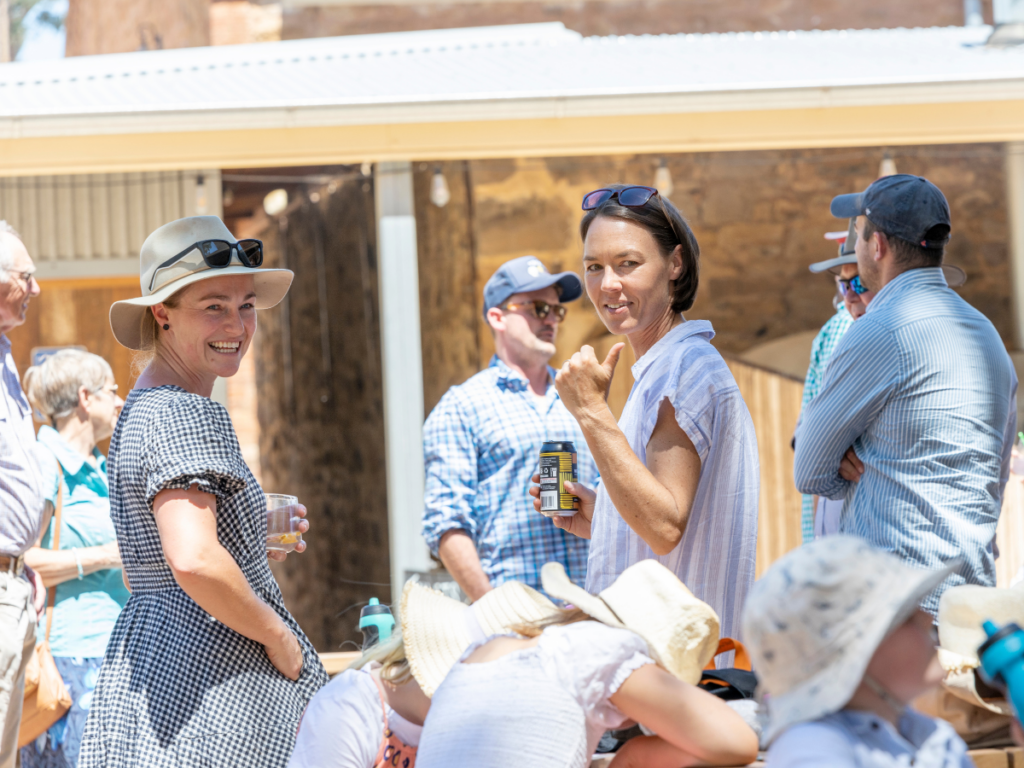
With the majority of communities in the region still reliant on agriculture, the social toll of the latest drought – the longest dry on record in 2020/21 – was evident, with symptoms of volunteer burn-out, self-isolation and mental health related issues.
Farmers know technology is essential, and farming systems have evolved significantly since the previous major drought, with stubble retention, improved efficiency of water use and a better understanding of livestock nutrition.
These communities are adaptable, open to innovation and aided through programs that promote not only professional connection, but also social and community connections, especially as these areas are typically not well-serviced by government research bodies and private consultants.
There are currently 11 Hubs under UNFS – eight geographical Hubs: Booleroo / Appila, Morchard / Orroroo / Pekina / Black Rock, Melrose, Gladstone / Laura, Jamestown, Nelshaby, Quorn and Wilmington and three non-geographic Hubs: Ladies on the Land, New Farmers and the Ag Tech Hub. The establishment of the Hubs in 2019 recognised the need to retain networks within the group and foster the tackling of issues on a smaller scale, as well as the importance of coming together on a social level.
A $20,000 Networks to Build Drought Resilience grant enabled UNFS to deliver the ‘Tools, Tech and Transformation’ workshop for farmers and agribusinesses. The key event was followed by a series of nine Hub events to provide the opportunity for networking, info-sharing, and learning about new farming systems and techniques to improve drought resilience. A ‘farmer-to-farmer’ learning model was recognised as a valuable and efficient mechanism to improve the productivity, profitability and sustainability of the agricultural industry in low rainfall zones.
“Through the Tools, Technology and Transformation event series, farmers and landholders have been provided with an abundance of information that can be adapted and changed on farm. Therefore, these tools that have been taken from the events can help farmers change their way of thinking and help their preparedness for drought or any other climate challenges they may face.”
The project reached 205 participants across 10 events that spanned six sector networks (Farm Business, Research Institute, NFP’s / Community Organisations, Consultants, Off Farm Business, Government Agency). Targeting farmers and agri-business directly, attendees learnt about tools aimed at improving efficiencies, sustainability and outcomes of operations like automatic feeding, as well as technology evolutions and business systems like satellite imagery on the farm scale, and succession and transition planning. Importantly, the solutions offered were all commercially available to be adopted on-farm, and farmers were able to speak directly with professionals in the fields, with discussions encouraged. They left with up-to-date knowledge to help them build more resilient farming systems.
The Hub events ensured accessibility for farmers who couldn’t afford too much time away from their land. They were able to talk with neighbours and researchers about the outcomes of the 2021 season and what they might be able to do better next time. Questions like when and how to de-stock, how to ensure you’re looking after genetics and bloodlines, and considerations around agisting, planting times, and upgrading tech vs repairing machinery were raised. Each Hub session included a training session in a tool, tech or system (identified from the key event by their elected Hub Representative), as well as a planning session identifying how to implement the new skills and knowledge on-farm, and where they require additional support.
Through the project, participants built knowledge and understanding of the risks posed by drought and climate change and learnt new concepts on a range of topics that can be adapted for drought and climate preparedness.
Communities had the opportunity to connect, train, converse (something many would not normally do in their usual day-to-day business) and lean on systems and each other so they are more prepared for future challenges.
It has been over 20 years since the rural town of Marama has had an active committee. In past generations of the committee, Marama Community Incorporated has been extremely social, connected and dedicated to keeping the town together. The main purpose of the committee was to bring people and community together with sport, dances, weddings, social events and church services. All of these events were usually held at the community-owned hall.
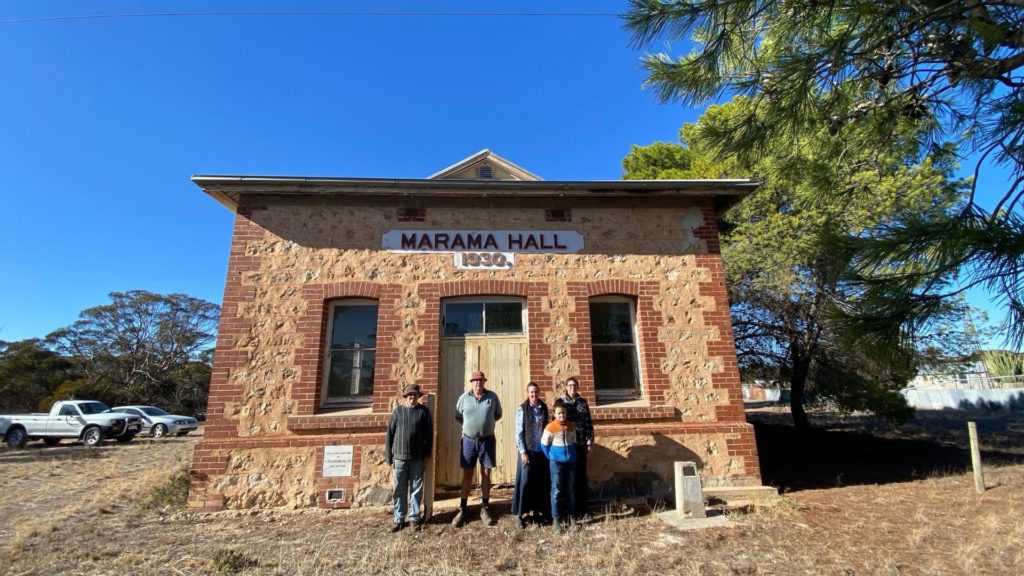
Now with a newly elected committee, the current generation was keen to foster a sense of belonging by renewing and improving the hall and providing a central place for activities to be held once again, however the space had fallen into disrepair after years of no use.
During the time the new committee was being elected, the district was also experiencing severe drought. A lot of the local farming community were feeling the effects on their mental health from prolonged drought. This added another layer of importance to the renewal of the hall; the community needed somewhere to come together and support one another.
With a $150,000 grant from the Australian Government’s Future Drought Fund’s Networks to Build Drought Resilience the committee was able to fund the underpinning, roof replacement, ceiling replacement, stone work, paint the interior, electrical work (including air-conditioning), and new toilet facilities.
The project relied on a big commitment from the community to get involved through volunteer work, local contractors and working bees to get the job done. But there was never any doubt they wouldn’t pull through!
Since completing the renovations on the hall the community has seen a dramatic shift in the attitudes of residents. Not only did the project give them a reason to meet throughout construction, but they now have a shared space to use that they can be proud of.
“Overall, the finished project is something we as a community are very proud of, and it has helped bring us together to work as a team to achieve a better, more user-friendly outcome.”
The hall has been host to a number of important community events since its completion and is booked in to host future events held by key industry groups that will benefit the community by improving abilities to adapt, reorganise or transform in response to a changing climate, increasing variability and scarcity of rainfall and changed seasonality of rainfall.

